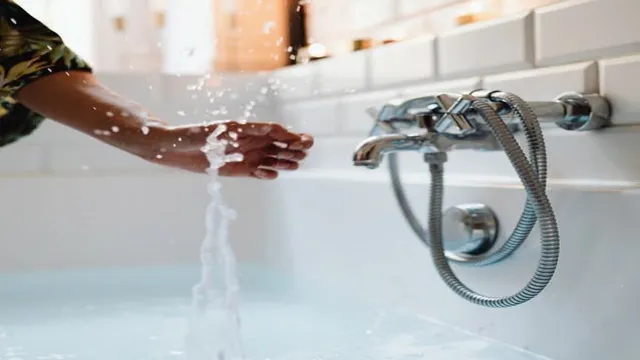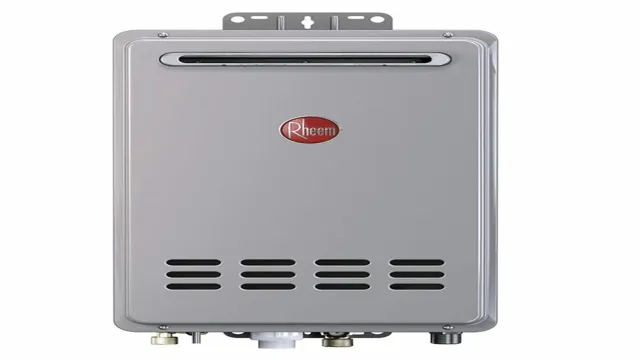Are you feeling frustrated because your tankless water heater is blowing cold air instead of hot water? Don’t worry, you’re not alone. Many homeowners experience this problem from time to time, and it can be quite a nuisance. After all, who wants to start their day with a cold shower? But before you start panicking and calling in a professional, there are a few things you can do to troubleshoot the issue and solve it yourself.
In this blog, we’ll explore the common causes of cold tankless water heaters and the steps you can take to fix them. So, grab a cup of coffee and let’s get started!
Understanding the Issue
Are you tired of your tankless water heater going cold after just a few minutes? Don’t worry, you’re not alone. One of the most common issues with tankless water heaters is that they may not provide hot water consistently. This can happen for a variety of reasons, including improper installation, low water flow, or a malfunctioning unit.
Tankless water heaters work by heating water as it passes through a heat exchanger and then delivering it directly to your fixtures. However, if the heat exchanger is not properly sized for your household’s needs, hot water may run out quickly. Additionally, if the flow rate of water is too low, the unit may shut off to prevent overheating, leading to cold showers.
It’s important to address these issues promptly to ensure that your tankless water heater functions properly and provides hot water when you need it.
What Causes Tankless Water Heater to go Cold?
Tankless water heaters have become increasingly popular due to their energy efficiency and space-saving design. However, one issue that can arise with them is a sudden decrease in hot water flow, leading to cold water. There can be several reasons why this occurs, including a clogged filter, insufficient gas supply, or a malfunctioning heating element.
Another common cause is simply overuse – if multiple people are using hot water simultaneously, the tankless heater may not be able to keep up with the demand. To prevent this issue, it’s important to properly size the unit and limit simultaneous hot water usage. Regular maintenance, such as flushing the unit and replacing filters, can also help ensure optimal performance.
By understanding what causes a tankless water heater to go cold, homeowners can address the issue promptly and enjoy the benefits of their unit for years to come.

Troubleshooting
Tankless water heaters can be a great investment for any homeowner, but they can also come with their fair share of issues. One of the most common complaints is when the tankless water heater goes cold after just a few minutes of use. There are several reasons why this might be happening.
One possibility is that the water flow is too low, which can cause the heater to shut off as a safety measure. Another potential cause is a dirty air intake filter, which can restrict airflow and cause the heater to shut down. In some cases, the problem may be a faulty temperature sensor or thermostat.
If you’re experiencing this issue, it’s important to troubleshoot the problem as soon as possible to prevent further damage to your unit. Start by checking the water flow and cleaning the air filter. If those don’t work, it’s time to call in a professional for further diagnosis and repairs.
By addressing the problem quickly, you can get your tankless water heater back up and running efficiently in no time.
Check for Blocked or Faulty Components
When troubleshooting electronic devices, it’s crucial to check for blocked or faulty components. One of the most common reasons why devices fail to work is because of a component that has been blocked by debris or dust. Over time, these particles can accumulate and cause the device to overheat, leading to permanent damage.
Therefore, it’s essential to keep your devices clean and free of debris. Another issue that can cause a device to malfunction is faulty components. These include anything from a broken switch to a damaged capacitor.
The best way to identify a faulty component is to use a multimeter or an oscilloscope to test the voltage and current flowing through the circuit. If a component is faulty, it will either read as open or shorted. In either case, you will need to replace the component with a new one to restore the functionality of your device.
By checking for blocked or faulty components, you can easily troubleshoot most issues with electronic gadgets and devices, ensuring they work optimally for longer periods.
Reset the Heater and Optimize Maintenance
If your heater suddenly stops working or is not providing efficient heat, there could be a variety of issues causing the problem. Before calling a professional, try resetting your heater to see if that solves the issue. Many modern heaters have an automatic shut-off feature that activates if there is an issue with the unit.
To reset it, simply turn off the power to the heater, either by unplugging it or turning off the circuit breaker, and wait a few minutes before turning it back on again. If this doesn’t work, it might be time to perform some routine maintenance on your heater. This includes cleaning or replacing the air filter, checking and adjusting the thermostat settings, and ensuring that all vents and ducts are clear and unobstructed.
By taking these steps regularly, you can prevent issues before they arise and keep your heater running efficiently all winter long. So, go ahead, reset your heater, and don’t forget to optimize your maintenance routine to ensure its longevity.
Possible Upgrades
If your tankless water heater goes cold after a few minutes, it can be frustrating to deal with on a daily basis. Fortunately, there are some possible upgrades that can help you resolve this issue. One solution is to install a recirculation system that will keep the hot water flowing throughout the pipes so that you don’t have to wait for it to heat up again.
Another option is to add an extra unit to support your existing tankless water heater, which will provide more hot water capacity during peak usage times. Additionally, you can replace your current unit with a larger one that is more suitable for your home’s hot water demands. Whatever upgrade you choose, make sure to consult with a professional plumber to ensure that it is installed correctly and safely.
By taking these steps, you can enjoy consistent access to hot water without any interruptions.
Upgrade Your Tankless Water Heater Size
If you’re finding that your current tankless water heater just isn’t cutting it anymore, it may be time to consider upgrading its size. There are a few possible upgrades you can choose from, depending on your needs and budget. First, you could simply upgrade to a larger model of the same brand and technology.
This is a straightforward solution that can offer more hot water to meet your growing demands. Another option is to switch to a different type of tankless water heater that has a higher flow rate or output, such as a gas or propane model. This can provide even more hot water, but may require additional installation or fuel costs.
Ultimately, it’s important to weigh the costs and benefits of each option before making a decision. By upgrading your tankless water heater size, you can ensure you always have hot water on demand for all your daily needs.
Upgrade to a Gas-Fired Heater
Gas-Fired Heater Upgrade Upgrading to a gas-fired heater is a smart move for those who want a more efficient and cost-effective heating system. Some possible upgrades to consider include a direct-vent gas-fired heater, which is ideal for homes without a chimney or venting system, or a high-efficiency gas-fired heater that uses less energy and produces fewer emissions. Another option is a tankless water heater, which heats water on demand instead of using a storage tank.
This upgrade can save homeowners money on their utility bills while providing a constant supply of hot water. Furthermore, gas-fired heaters are safer and more reliable than their electric counterparts, making them a popular choice for homeowners across the country. By upgrading to a gas-fired heater, homeowners can enjoy a more comfortable and reliable heating system while saving money and reducing their carbon footprint.
Professional Help
If your tankless water heater goes cold after just a few minutes, it can be frustrating. Luckily, there are some professional solutions that can help with this issue. A common reason for a tankless water heater to go cold is due to mineral buildup in the unit.
A professional plumber can flush the system to remove any buildup and ensure that your unit is functioning at its best. Another possible solution is to check the size of the unit. If the tankless water heater is too small for the demand of your household, it may not be able to keep up with the demand for hot water.
A professional can help assess your household’s needs and determine if a larger unit is necessary. Additionally, a malfunctioning part could be the cause of your tankless water heater going cold. A professional can diagnose and replace the faulty part to get your unit back to running smoothly.
Seek Professional Plumbing Services for a Lasting Solution
When it comes to plumbing issues, it’s always best to seek professional help. As much as we think we can handle small repairs, there’s always a chance we can do more harm than good. That’s where a professional plumbing service comes in.
They have the experience and expertise to handle even the most complex plumbing problems. From leaks and clogs to installation and maintenance, they’ve got you covered. Not only will they solve the problem at hand, but they’ll also prevent further damage from occurring.
So, the next time you’re faced with a plumbing issue, don’t hesitate to call a professional. Let them take care of it so you can sit back, relax and have peace of mind.
Conclusion
So, it turns out that a tankless water heater is like that one friend who promises to always be there for you, but ends up flaking out after a few minutes. While it may seem like a convenient and efficient option, the lack of a storage tank can lead to inconsistent temperature control and unexpected cold showers. Just like friendships, sometimes it’s better to have a reliable old tank than to rely on something new and flashy that may leave you feeling cold in the end.
“
FAQs
Why does my tankless water heater go cold after a few minutes?
One possible reason is that the unit is undersized for your hot water needs. Another reason could be a malfunctioning heating element or a blockage in the water line.
How can I fix my tankless water heater when it goes cold?
First, check the water flow rate and make sure it’s not below the manufacturer’s recommended level. You may also need to clean the unit’s filter or descale the heat exchanger. If none of these solutions work, it’s best to call a professional.
Can a tankless water heater lose efficiency over time?
Yes, like any appliance, a tankless water heater can experience wear and tear that affects its performance. It’s important to have it inspected and maintained regularly to ensure it’s running at optimal efficiency.
Is it possible to have too high of a demand for hot water with a tankless water heater?
Yes, if you have a large family or frequently use hot water for multiple tasks at once, a tankless water heater may struggle to keep up with the demand. In this case, it may be necessary to install a larger unit or a separate tank water heater as a backup.

